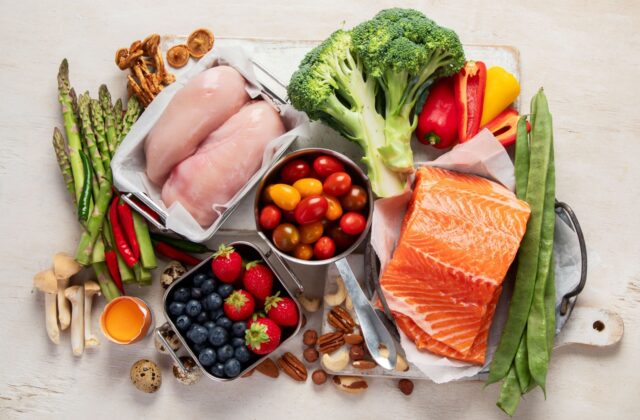As we age, maintaining a balanced and nutritious diet becomes increasingly important for supporting overall health and well-being. A well-rounded diet rich in vitamins, minerals, and antioxidants can help manage weight, reduce the risk of chronic diseases, and enhance overall quality of life.
By incorporating nutrient-dense foods into your meals, you can better equip your body to handle the changes that come with aging. 10 healthy foods to consider adding to your diet to support healthy aging include:
- Leafy greens
- Berries
- Fatty fish
- Nuts and seeds
- Whole grains
- Legumes
- Dairy or dairy alternatives
- Cruciferous vegetables
- Avocados
- Green tea
1. Leafy Greens
Leafy green vegetables, such as spinach, kale, and Swiss chard, are nutritional powerhouses. These greens are packed with vitamins A, C, and K, as well as folate and fiber. Vitamin A is essential for maintaining healthy vision, while vitamin C boosts the immune system and supports skin health. Vitamin K is crucial for bone health, which becomes increasingly important as we age.
The fiber found in leafy greens also aids digestion and helps maintain a healthy weight. Regular consumption of leafy greens has been associated with a reduced risk of chronic conditions such as heart disease and diabetes.
2. Berries
Berries, including blueberries, strawberries, raspberries, and blackberries, are loaded with antioxidants like vitamin C and flavonoids. These antioxidants combat oxidative stress and inflammation, both of which contribute to the aging process. In particular, berries have been shown to support brain health by helping to slow cognitive decline.
Additionally, the flavonoids found in berries can promote heart health by improving blood flow and lowering blood pressure. Incorporating a variety of berries into your diet can provide numerous benefits to both your brain and cardiovascular health.
3. Fatty Fish
Fatty fish such as salmon, mackerel, and sardines are rich in omega-3 fatty acids, which are essential for maintaining brain function and promoting heart health. Omega-3s have been linked to improved memory and cognitive performance, as well as reduced inflammation in the body.
These fish are also a great source of protein, which helps support muscle mass—a critical aspect of aging healthily. Regular consumption of fatty fish may lower the risk of chronic diseases, including cardiovascular disease, and help protect against cognitive decline and dementia.
4. Nuts & Seeds
Nuts like almonds and walnuts, and seeds such as chia seeds and flaxseeds, are rich in healthy fats, protein, and fiber. These nutrient-dense snacks provide a steady source of energy and help promote heart health by lowering cholesterol levels. They also contain essential minerals like magnesium, which supports bone health and regulates blood sugar levels.
The healthy fats found in nuts and seeds can also help with weight management by making you feel fuller for longer, reducing the risk of overeating and unhealthy snacking. Additionally, these foods may reduce inflammation and the risk of chronic diseases like heart disease and type 2 diabetes.
5. Whole Grains
Whole grains such as brown rice, quinoa, oats, and whole wheat bread are rich in fiber and B vitamins, making them a great addition to any diet. Fiber helps regulate blood sugar levels, which is crucial in managing weight and preventing type 2 diabetes. Whole grains also support digestive health by promoting regular bowel movements and feeding beneficial gut bacteria.
Furthermore, they provide sustained energy throughout the day, making them an excellent choice for individuals who need to maintain an active lifestyle in their later years. By replacing refined grains with whole grains, you can improve your overall health and well-being.
6. Legumes
Beans, lentils, chickpeas, and other legumes are excellent plant-based protein sources, making them a great option for vegetarians and those looking to reduce their intake of animal products. These foods are high in fiber, which supports digestion and helps regulate blood sugar levels.
Legumes are also packed with essential minerals like iron and potassium, which are important for maintaining healthy muscles and blood pressure. Regularly consuming legumes can help reduce the risk of heart disease, manage blood sugar levels, and improve digestive health.
 7. Dairy or Dairy Alternatives
7. Dairy or Dairy Alternatives
Low-fat yogurt, milk, and fortified plant-based alternatives like almond or soy milk provide calcium and vitamin D, which are crucial for bone health and preventing osteoporosis.
8. Cruciferous Vegetables
Broccoli, cauliflower, and Brussels sprouts contain compounds that may help detoxify the body and reduce the risk of certain cancers. They are also high in fiber and essential vitamins.
9. Avocados
Avocados are rich in monounsaturated fats, which support heart health, and contain vitamins E and K, which are important for skin health and blood clotting.
10. Green Tea
Green tea is high in antioxidants, particularly catechins, which may help improve brain function, support fat metabolism, and reduce the risk of certain cancers.
Live a Vibrant, Healthy Life!
Incorporating these foods into your daily diet can provide essential nutrients that support healthy aging. To promote overall health, it’s important to maintain a balanced diet, stay hydrated, and engage in regular physical activity.
For those seeking a supportive community that emphasizes healthy living, consider exploring The Neighborhood in Rio Rancho. Our Life Plan Community offers a range of services and amenities designed to promote well-being and active living. Book a tour today!


